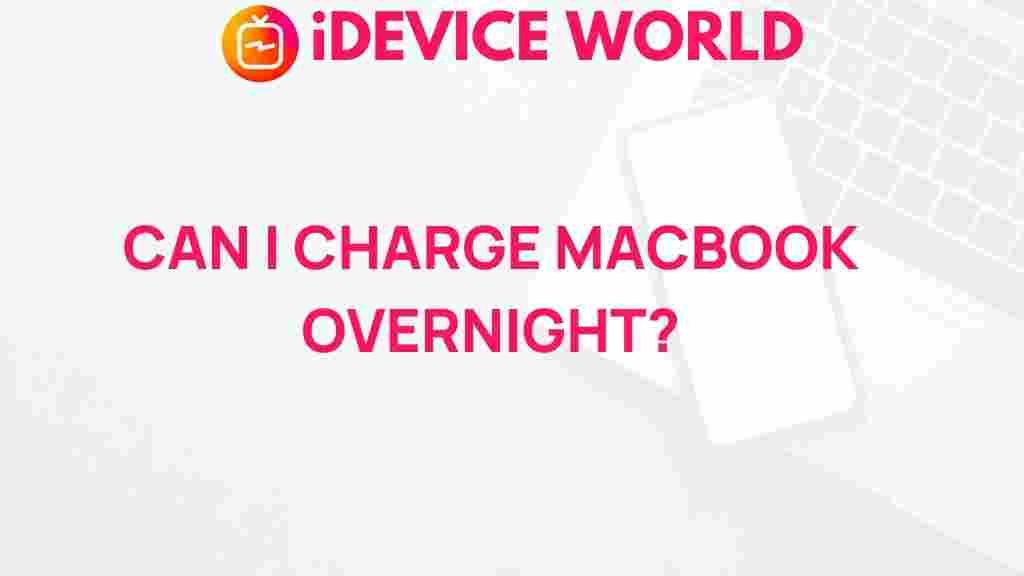Unveiling the Truth: Is It Safe to Charge Your MacBook Overnight?
Charging your MacBook overnight has become a common practice among users who want to ensure their devices are ready for use the next day. However, this habit raises concerns about battery health, safety, and overall device longevity. In this article, we will explore the safety of charging your MacBook overnight, examining the technology behind MacBook batteries, the risks involved, and best practices for maintaining optimal battery health.
Understanding MacBook Batteries
Before diving into the safety of overnight charging, it’s essential to understand the technology behind MacBook batteries. Most MacBooks use lithium-ion batteries, known for their efficiency and longevity. Here are some key points about lithium-ion batteries:
- Charge Cycles: A charge cycle is defined as using 100% of your battery’s capacity, but not necessarily all at once. For example, using 50% one day and 50% the next day counts as one charge cycle.
- Battery Lifespan: Lithium-ion batteries typically last between 300 to 1000 charge cycles, depending on usage and care.
- Smart Charging: MacBooks are equipped with smart charging technology that helps manage battery health by controlling the charging speed and preventing overcharging.
Is It Safe to Charge Your MacBook Overnight?
Charging your MacBook overnight is generally considered safe due to several factors:
- Smart Charging Features: As mentioned, MacBooks come with intelligent charging systems that stop charging once the battery reaches 100%. This feature prevents overcharging, which can damage the battery.
- Heat Management: Modern MacBooks are designed to dissipate heat effectively, reducing the risk of overheating during charging.
- Battery Health Management: Recent macOS versions include battery health management features that optimize charging based on your usage patterns.
Potential Risks of Overnight Charging
While charging your MacBook overnight is safe, there are some potential risks to be aware of:
- Heat Buildup: If your MacBook is placed on a soft surface like a bed or couch while charging, it can trap heat, potentially leading to overheating.
- Battery Calibration: Frequent overnight charging can affect the calibration of your battery, leading to inaccurate battery level readings.
- Old Hardware: Older MacBook models may not have the same safety features as newer ones, making them more susceptible to battery-related issues.
Best Practices for Charging Your MacBook
To ensure the longevity of your MacBook’s battery while charging overnight, consider the following best practices:
- Use the Original Charger: Always use the charger that came with your MacBook or a certified replacement to ensure optimal charging.
- Avoid Soft Surfaces: Place your MacBook on a hard, flat surface while charging to allow for proper heat dissipation.
- Enable Battery Health Management: Make sure your MacBook is running the latest macOS and has the battery health management feature enabled to prolong battery lifespan.
- Monitor Charging Habits: If you notice your battery health declining, consider adjusting your charging habits, such as avoiding overnight charging occasionally.
Step-by-Step Process for Safe Overnight Charging
To safely charge your MacBook overnight, follow these steps:
- Check Battery Health: Before plugging in your MacBook, check the battery health by going to System Preferences > Battery > Battery Health.
- Close Unused Applications: Close any unnecessary applications to reduce the workload on your MacBook while it charges.
- Place on a Hard Surface: Set your MacBook on a flat, hard surface to prevent heat buildup.
- Plug in the Charger: Connect the charger securely to your MacBook and the wall outlet.
- Monitor Temperature: Periodically check if your MacBook feels excessively hot during charging. If it does, unplug it and allow it to cool down.
- Unplug When Fully Charged: While the MacBook will stop charging at 100%, it’s a good habit to unplug it in the morning to avoid keeping it at full charge for too long.
Troubleshooting Common Charging Issues
If you encounter issues while charging your MacBook overnight, consider the following troubleshooting tips:
- MacBook Won’t Charge: Check the charger and cable for damage. Try a different outlet or charger if necessary.
- Battery Not Holding Charge: If your MacBook drains quickly, check the battery health and consider recalibrating the battery.
- Overheating During Charging: Ensure proper ventilation and consider using a cooling pad if your MacBook overheats frequently.
- Battery Health Decline: If you notice a significant drop in battery health, it may be time for a replacement. Consult an authorized service provider.
Conclusion
In conclusion, charging your MacBook overnight is generally safe, especially with the built-in smart charging features designed to protect your battery. However, being mindful of best practices, such as ensuring proper ventilation and using the correct charger, can further enhance battery health and longevity. By following the tips outlined in this article, you can confidently charge your MacBook overnight without compromising its performance.
For more information on battery care and troubleshooting tips, check out Apple’s official support page here. If you have any specific questions or concerns about your MacBook, feel free to reach out to our support team for assistance.
This article is in the category Guides & Tutorials and created by iDeciveWorld Team
